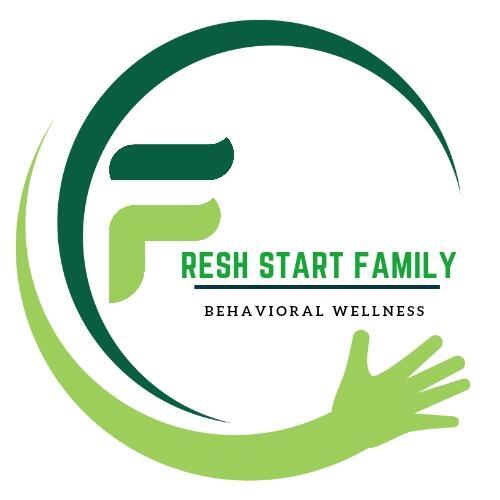Feeling a lingering sadness can be overwhelming, and it’s easy to dismiss it as just feeling down. However, it’s crucial to understand that emotions can often be more complex. Many people wonder if what they’re experiencing is more than just sadness, and that’s perfectly normal. Recognizing the signs of depression is the first step towards seeking help and reclaiming your emotional well-being. In this guide, we’ll explore how to know if you have depression, examining common symptoms and experiences that may indicate deeper issues. It’s important to identify these signs early on, as they can significantly impact your daily life and overall happiness.
What is Depression?
Depression is a serious mental health condition that affects your mood, thoughts, and overall well-being. Unlike normal feelings of sadness, depression is persistent and can last for weeks, months, or even longer. It impacts how you feel about yourself and the world around you, often leaving you hopeless and helpless. It’s important to understand that depression isn’t just a “bad mood” — it’s a medical condition that requires attention and care.
While everyone experiences sadness or grief at various points in life, depression is different. Sadness usually fades with time or changes in circumstances, but depression persists and often worsens over time. It can affect your ability to function in everyday life, overwhelming simple tasks like getting out of bed or interacting with others. Additionally, depression can lead to physical symptoms, such as fatigue, changes in appetite, and sleep disturbances, which are not typically present in normal sadness.
How to Know If You Have Depression: More Than Just a Bad Day
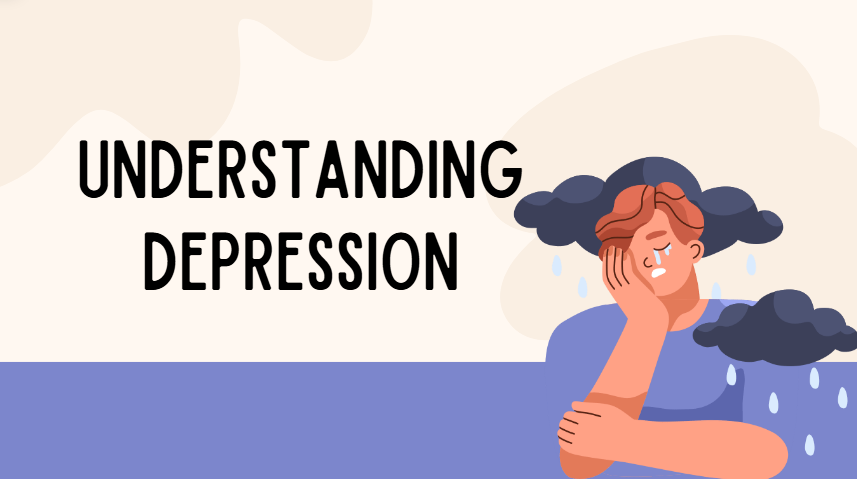
Depression symptoms go beyond the occasional bad day. It’s a persistent state of emotional, physical, and mental exhaustion that affects nearly every aspect of life. Recognizing these symptoms early is crucial for seeking help and improving overall well-being before it worsens.
Physical Symptoms:
- Depression often disrupts sleep, either causing insomnia (difficulty falling or staying asleep) or hypersomnia (sleeping excessively). Both extremes leave individuals feeling unrested, worsening the overall sense of fatigue and low energy.
- A loss or increase in appetite is a common symptom of depression. Some people may lose interest in food and struggle to eat, while others might find themselves eating more than usual as a way to cope with emotional distress.
- Even after a full night’s sleep, people with depression often feel physically drained. No matter how much rest is obtained, the constant sense of tiredness makes it difficult to accomplish even the simplest of tasks.
Emotional Symptoms:
- One of the hallmark symptoms of depression is a deep, lingering sadness that doesn’t seem to go away. This feeling of hopelessness can make it difficult to see a way out and create a sense of emotional numbness.
- Depression often triggers a low tolerance for frustration. Even small, everyday annoyances can feel overwhelming, leading to irritability and frequent outbursts, which can strain relationships.
- People with depression may lose interest in activities they previously found pleasurable, whether that’s socializing with friends, pursuing hobbies, or engaging in work. This lack of interest can lead to isolation and further feelings of despair.
- Many individuals with depression experience overwhelming feelings of guilt or worthlessness, even when there’s no logical reason for it. This self-blame can negatively impact self-esteem and make it harder to reach out for help.
Cognitive Symptoms:

- Depression can cloud your ability to focus and make decisions, even on simple matters. You may find it hard to concentrate at work, in conversations, or when trying to accomplish everyday tasks, leading to frustration and a sense of inadequacy.
- Those experiencing depression often have a harsh inner dialogue filled with self-criticism and feelings of worthlessness. This negative thinking can reinforce the belief that one is incapable or undeserving of success, love, or happiness.
- One of the most serious cognitive symptoms of depression is the presence of suicidal thoughts or thoughts of death. If someone is experiencing these feelings, it’s crucial to seek immediate professional help or reach out to a trusted person for support.
Behavioral Changes:
- As depression takes hold, people often isolate themselves from friends, family, and social events. This withdrawal can result in feelings of loneliness and further deepen the depressive state, as avoiding social connections prevents positive engagement and support.
- Depression can make it hard to keep up with everyday responsibilities, whether personal or professional. People may neglect work, household tasks, or personal hygiene, as the overwhelming feelings of depression can make even the simplest tasks feel insurmountable.
- Some individuals may cope with depression through unhealthy behaviors, such as substance abuse, reckless actions, or even self-harm. These behaviors are often attempts to numb the emotional pain or regain some sense of control.
How Depression Manifests Differently in People
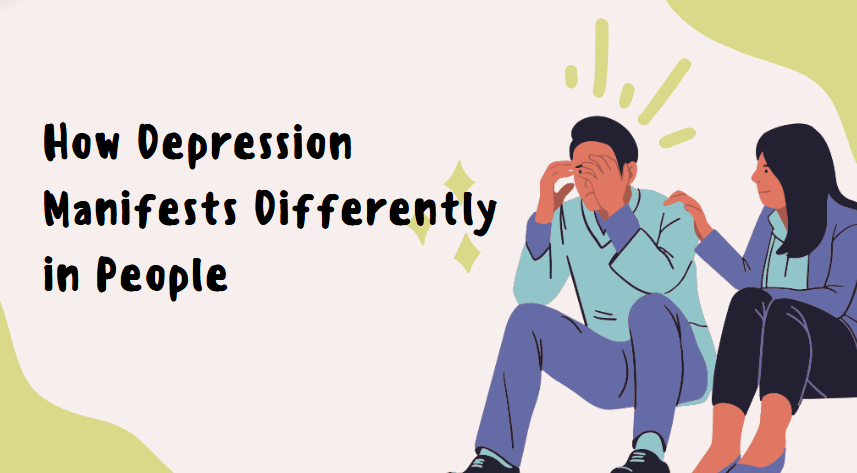
Depression doesn’t affect everyone the same way. It can manifest differently based on age, gender, and life stage. Understanding these variations helps recognize depression more effectively and seek appropriate support.
1. Men
Men with depression may experience irritability, anger, and risk-taking behaviors, often masking their sadness. They might be less likely to seek help and exhibit physical symptoms like increased fatigue or unexplained aches.
2. Women
Depression in women often involves intense feelings of sadness, guilt, and worthlessness. They are more likely to experience changes in appetite and sleep patterns and may internalize their emotions, leading to self-blame or hopelessness.
3. Teens
In teens, depression may present as irritability, social withdrawal, or academic struggles. They might also engage in risky behaviors or show drastic changes in their appearance, making it harder to recognize typical depression symptoms.
4. Older Adults
In older adults, depression can be mistaken for normal aging, with symptoms like memory problems, fatigue, or physical pain. They may also experience a loss of interest in activities, social withdrawal, or a decline in their physical health.
Distinguishing Between Depression and Anxiety
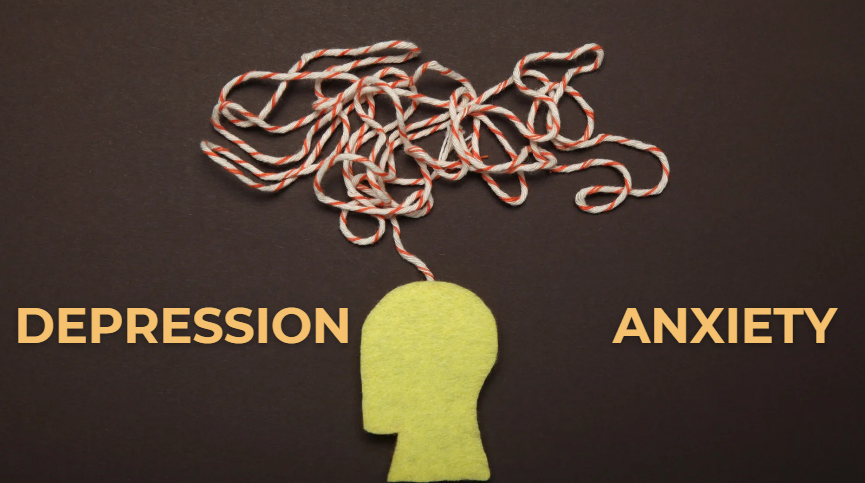
It’s worth noting that certain symptoms can overlap between depression and anxiety, leading to confusion. For example, feelings of restlessness, fatigue, and trouble concentrating are common. The challenge is distinguishing how these symptoms manifest and the underlying emotional experiences that drive them, often requiring careful observation and self-awareness.
Nevertheless, there are distinct differences between the two conditions. Depression is primarily marked by feelings of deep sadness, hopelessness, and lack of motivation, while anxiety often manifests as excessive worry, fear, or nervousness. Understanding these core emotional patterns can help you recognize which condition may be affecting you, enabling you to seek targeted care.
| Condition | Depression Without Anxiety | Depression with Anxiety |
| Emotional State | Overwhelming feelings of hopelessness and helplessness, often leading to a belief that things will never improve. | Persistent worry, nervousness, and fear, alongside the depressive feelings. |
| Energy Levels | Low energy, sluggishness, and difficulty getting motivated to do everyday tasks. | Tension and jitteriness, with racing thoughts that often feel out of control. |
| Thought Patterns | A bleak view of the future with little hope for change, leading to a sense of resignation. | Overthinking about the future, accompanied by repetitive, anxious thoughts about potential threats or challenges. |
| Physical Symptoms | Fatigue, sluggishness, and a general sense of being physically drained. | Increased heart rate, restlessness, and physical tension. |
| Focus and Concentration | Difficulty concentrating due to overwhelming sadness or apathy. | Trouble concentrating due to racing thoughts or an inability to calm down mentally. |
| Overall Impact on Daily Life | A lack of interest or motivation to engage in daily activities, which can feel overwhelming and pointless. | A constant state of alertness or hypervigilance, leading to exhaustion from both emotional and physical strain. |
Comparing Depression and Bipolar Disorder (Manic Depression)
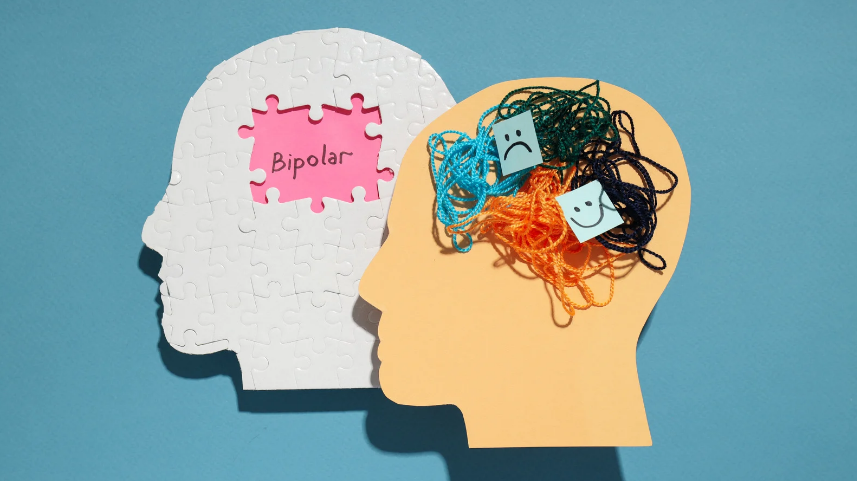
Depression and bipolar disorder share overlapping symptoms, such as low mood and loss of interest in activities. However, bipolar disorder also includes extreme mood swings, alternating between depressive episodes and manic or hypomanic states, where individuals may feel euphoric, overly energetic, or impulsive.
Understanding these differences is key to proper diagnosis and treatment. If mood swings are present alongside depressive symptoms, seeking professional help is crucial for accurate care.
Conditions That Resemble Depression Symptoms
Several conditions can mimic the symptoms of depression, making it difficult to distinguish between them. While these conditions share similar emotional and physical signs, understanding the differences is essential for getting the right diagnosis and treatment. Here are five conditions that can resemble depression:
- ADHD can cause difficulty concentrating, restlessness, and low motivation, similar to depression. However, ADHD is often characterized by impulsivity and hyperactivity, particularly in children, which is different from the persistent sadness and hopelessness seen in depression.
- Parkinson’s disease, a neurodegenerative disorder, can cause motor symptoms like tremors and stiffness, along with mood changes like depression. The feeling of apathy, fatigue, and difficulty focusing can often be mistaken for depression, especially in the early stages of Parkinson’s.
- Fibromyalgia is a chronic pain condition that leads to widespread muscle pain, sleep disturbances, and fatigue. These symptoms can overlap with depression, as people with fibromyalgia often experience low mood and difficulty finding joy in everyday activities due to constant discomfort.
- Chronic Fatigue Syndrome causes extreme, persistent fatigue that isn’t alleviated by rest, often accompanied by memory problems and poor sleep quality. It can be confused with depression, particularly because it also leads to a lack of energy and motivation, which are common in depressive states.
When to Seek Help: Trusting Your Gut
It’s important to remember that seeking help is a sign of strength, not weakness. Reaching out for support can be the first step toward healing and taking control of your mental health.
If you’ve been struggling with your mental health and things aren’t improving, it may be time to consider professional support. Trusting your gut is crucial in recognizing when you need help.
Here are a few key signs:
- Persistent symptoms lasting longer than two weeks:
- If your sadness, fatigue, or hopelessness persists for two weeks or longer, it’s a clear sign that something deeper may be happening.
- Symptoms affecting work, relationships, or daily functioning:
- When depression or anxiety begins to interfere with your ability to perform at work, maintain relationships, or complete daily tasks, professional help is necessary to regain balance.
- Experiencing suicidal thoughts or self-harm:
- If you ever have thoughts of death, suicide, or self-harm, it’s critical to seek help immediately. These feelings are serious and require urgent attention from a professional.
Types of Professionals Who Can Help:

There are a variety of mental health professionals who can provide the support you need. The right help may come in therapy, medication, or both. Here are some of the professionals who can assist:
- Therapists or counselors: Offer talk therapy to help explore feelings, develop coping strategies, and address emotional challenges.
- Psychologists: Specialize in diagnosing and treating mental health disorders, often through therapy or testing.
- Psychiatrists: Medical doctors who can prescribe medication and provide therapy for more complex mental health issues.
- Primary care physicians: Can provide initial support, prescribe medications, and refer you to mental health specialists if needed.
Reaching out for help is a crucial step toward feeling better, and there are many professionals ready to support you on your journey. You’re not alone in this. Whether it’s a therapist, psychologist, psychiatrist, or primary care physician, there are professionals who understand and are ready to help you.
Final Thoughts
Recognizing depression is the first step toward healing. Understanding its symptoms—whether physical, emotional, cognitive, or behavioral—can help differentiate it from other conditions. Remember, there is hope for recovery. Seeking help, whether through therapy, medication, or self-care strategies, can make a significant difference in regaining control of your life.
Reflect on your mental health and take that first step toward improvement. Whether talking to someone you trust or scheduling an appointment with a professional, help is available. Start Behavioral Wellness is here for you. With years of experience in supporting individuals through depression and other challenges, our team of trusted professionals is ready to listen and guide you. Don’t just take our word for it—read our clients’ testimonials and see how we’ve helped others. Let us be your confidant in navigating life’s struggles. Contact us today at 910-436-6495.
